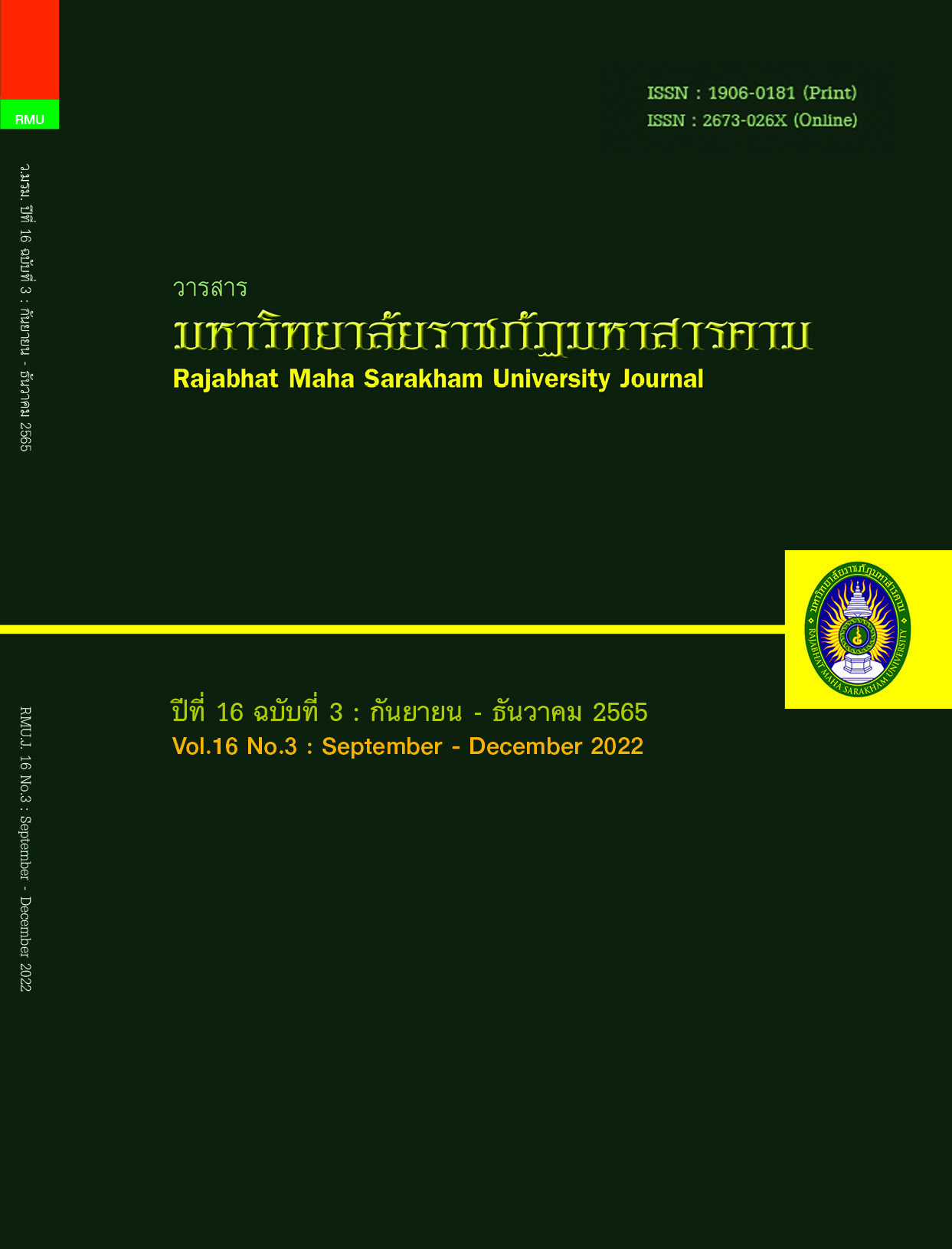Students’ Perceptions on Preparation Strategies Used by Stakeholders: A Case of English O-NET Achievement
Main Article Content
บทคัดย่อ
The present study investigates the factors that influence higher O-NET scores of Grade 9 secondary students in Mahasarakham, Thailand, and provides guidelines for good practice, which will hopefully support Grade 9 and 12 students to successfully cope with the O-NET tests and increase their awareness and scores and together with teachers to raise the practical preparation of the O-NET tests in facilitating the students. The participants were 214 Grade 10 students from a school in Mahasarakham province, with the highest O-NET results in the past three years. Data were collected using a close and open-ended questionnaire to probe into the students’ opinions on the strategies used by the school, the English teachers, and themselves to prepare for the test. The results indicated that the involved strategies, i.e., school, teacher, and student strategies, positively promoted the increase of the O-NET results. With regards to the school strategies, most of the participants agreed that the three common strategies the school employed in preparing them for the English O-NET were: offering the O-NET bank resources in the library (80.84%), conducting tutorials (75.70%), and providing extra exercise resources in the library (75.70%). The results also showed that English teachers at the school used various strategies, such as teaching relevant lesson contents (79.44%), teaching vocabulary items and language structures (78.50%), and using extra exercises and training strategies in the classroom (70.10%) in preparing them for the exam, and for which they found useful. For student strategies, the findings showed that there were only three strategies that reached high average percentages of student agreement (i.e., compensation strategies (86.45%), social strategies (80.68%), and memory strategies (60.05%). Based on these findings, the guidelines for good practice and the implications for language learning and strategies were proposed and positively supported students to cope with the O-NET tests and increase their scores.
Article Details

อนุญาตภายใต้เงื่อนไข Creative Commons Attribution-NonCommercial-NoDerivatives 4.0 International License.
1. บทความที่ลงตีพิมพ์ทุกเรื่องได้รับการตรวจทางวิชาการโดยผู้ประเมินอิสระ ผู้ทรงคุณวุฒิ (Peer Review) สาขาที่เกี่ยวข้อง อย่างน้อย 3 ท่าน ในรูปแบบ Double blind review
2. ข้อคิดเห็นใด ๆ ของบทความที่ลงตีพิมพ์ในวารสารมหาวิทยาลัยราชภัฏมหาสารคาม นี้เป็นของผู้เขียน คณะผู้จัดทำวารสารไม่จำเป็นต้องเห็นด้วย
3. กองบรรณาธิการวารสารมหาวิทยาลัยราชภัฏมหาสารคาม ไม่สงวนสิทธิ์การคัดลอกแต่ให้อ้างอิงแสดงที่มา
เอกสารอ้างอิง
Atchia, S., & Chinapa, V. (2019). Factors affecting academicachievement of secondary school students in Mauritius. Journal of Education and Research, 9(1), 70-90. https://doi.org/10.3126/jer.v9i1.28825
Crookes, G., & Schmidt, R. (1991). Motivation: Reopening the research agenda. Language Learning, 41(4), 469-512. http://dx.doi.org/10.1111/j.1467-1770.1991.tb00690.x
Dörnyei, Z. (2001). Teaching and researching motivation. Harlow: Pearson Education.
Ehrman, M., & Dornyei, Z. (1998). Interpersonal dynamics in second language education. Laguna Niguel: Sage. Ellis, R. (2001). The study of second language acquisition.Oxford: Oxford University Press.
Habók, A., & Magyar, A. (2018). The effect of language learning strategies on proficiency, attitudesand school achievement. Frontiers in Psychology,8, 1-8. https://doi.org/10.3389/fpsyg.2017.02358
Hunt, E., & Agnoki, F. (1991). The Whorfian hypothesis: A cognitive psychology perspective. Psychological Review, 98(3),377-389. https://doi.org/10.1037/0033-295X.98.3.377
Jones, R. (1998). Two faces of AIDS in Hong Kong: Cultureand the construction of the AIDS celebrity.Discourse and Society 9(3), 353-382. https://doi.org/10.1177/0957926598009003002
Kendra, C. (2021, February 20). Attitudes and behavior in psychology. Retrieved from verywellmind: https://www.verywellmind.com/attitudes-how- they-form-change-shape-behavior-2795897?print
Krashen, S. (1985). The input hypothesis: Issues and implications. London: Longman.
Massopha, C., & Wongsaphan, M. (2020). The study ability of scientific literacy of grade 10 student in the Secondary Education Service Area 26 Mahasarakham provine. Journal of Roi Et Rajabhat University, 14(3), 168-176. Retrieved from https://so03.tci-thaijo.org/index.php/reru/article/view/223781
Ministry of Education. (2008, November). The Thai education system towards a learning society. Retrieved from http://www.bic.moe.go.th/images/stories/book/ed-eng-series/intro-ed08.pdf
Ministry of Education. (2018). Education in Thailand 2018. Bangkok: Office of the Education Council Ministry of Education. Retrieved from https:// fliphtml5.com/wbpvz/jhqv
Nammala, N. (2016). Factors affecting parents’ decisions on sending their children to primary education at La-or Utis Demonstration Scool. SDU.Res. Journal, 12(1), 57-71. Retrieved from http://arcbs.bsru.ac.th/journal/File67083.pdf
NIETS. (2021). The National Institute of Educational Testing Service (Public Organization) conducted the Ordinary Nation Education Test (O-NET) in the 2021 academic year for grade 12 students. Retrieved from https://www.niets.or.th/en/content/view/25223
O’Malley, J. M., & Chamot, A. U. (1990). Learning strategies in second language acquisition. Cambridge: Cambridge University Press.
Oxford, R. L. (1990). Language learning strategies: What every teacher should know. Boston: Heinle & Heinle.
Pootrakul, P. (2014). Key determinants of the education quality of secondary schools in Bangkok. Bangkok: School of Public Administration.
Prapphal, K. (2008). Issues and trends of language testing and assessment in Thailand. Language Testing, 25(1), 127-143. https://doi.org/10.1177/0265532207083748
Pringprom, P. (2008). A study of fundamental English learning strategies of the first year and the second year students. Bangkok: Bangkok University.
Purpura, J., (1999). Learner characteristics and L2 test performance. In R. L. Oxford (Ed.), Language learning strategies in the context of autonomy, synthesis of findings from the International Invitational Conference on Learning Strategy Research (pp. 61-63). Columbia University.
Saville-Troike, M. (2006). Introducing second language acquisition. Cambridge University Press.
Scarcella, R., & Oxford, R. (1992). The tapestry of language learning: The individual in the communicative classroom. Boston: Heinle & Heinle.
Sritrskarn, N.-o. (2021). English O-NET and the core curriculum: Expectations and alignments. Rangsit Journal of Educational Studies, 8(1), 26-45. https://doi.org/10.14456/rjes.2021.3
Sukying, A., Wan-a-rom, U. & Phusawisot, P. (2012). Is it washback? A case study of the EFL O-Net and ELT coursebooks in Thailand. Proceedings of the 1st ASEAN plus three graduate research congress, March 1-2, 2012. Chiang Mai, Thailand.
Suwathanpornkul, I. (2015). Analysis and synthesis of strategies to develop students’ quality using Ordinary National Educational Testing (O-NET) results: A multi-case study of O-NET high score schools. Journal of Research Methodology, 28(1), 27-47.
Swain, M. (1985). Communicative competence: Some roles of comprehensible input and comprehensible output in its development. In S. Gass, & C. Madden (Eds.), Input in second language acquisition (pp. 235-253). Rowley, MA: Newbury House.
Waterson, N., & Snow, C. (1978). The development of communication. New York: Wiley and Sons.
Wiling, K. (1988). Learning styles in adult migrant education. Sydney: National Centre for English Language Teaching and Research.


